Strategic Analysis of Tesco: SWOT, TOWS, and PESTLE Report - Impact
VerifiedAdded on 2022/11/30
|7
|1664
|266
Report
AI Summary
This report presents a comprehensive strategic analysis of Tesco, a global grocery and retail corporation, utilizing PESTLE, SWOT, and TOWS frameworks. The PESTLE analysis examines the political, economic, social, technological, legal, and environmental factors influencing Tesco, highlighting both opportunities and threats, with specific focus on the impacts of COVID-19 and Brexit. The SWOT analysis identifies Tesco's strengths (e.g., increased shipping capacity), weaknesses (e.g., consumer complaints), opportunities (e.g., meat substitute market), and threats (e.g., Brexit regulations). Finally, the TOWS analysis integrates these internal and external factors to formulate strategic recommendations for Tesco's future growth and resilience, particularly in light of the pandemic and changing market dynamics. The report concludes that Tesco can take the pandemic as an opportunity to continue serving their customers and overcome the problems.
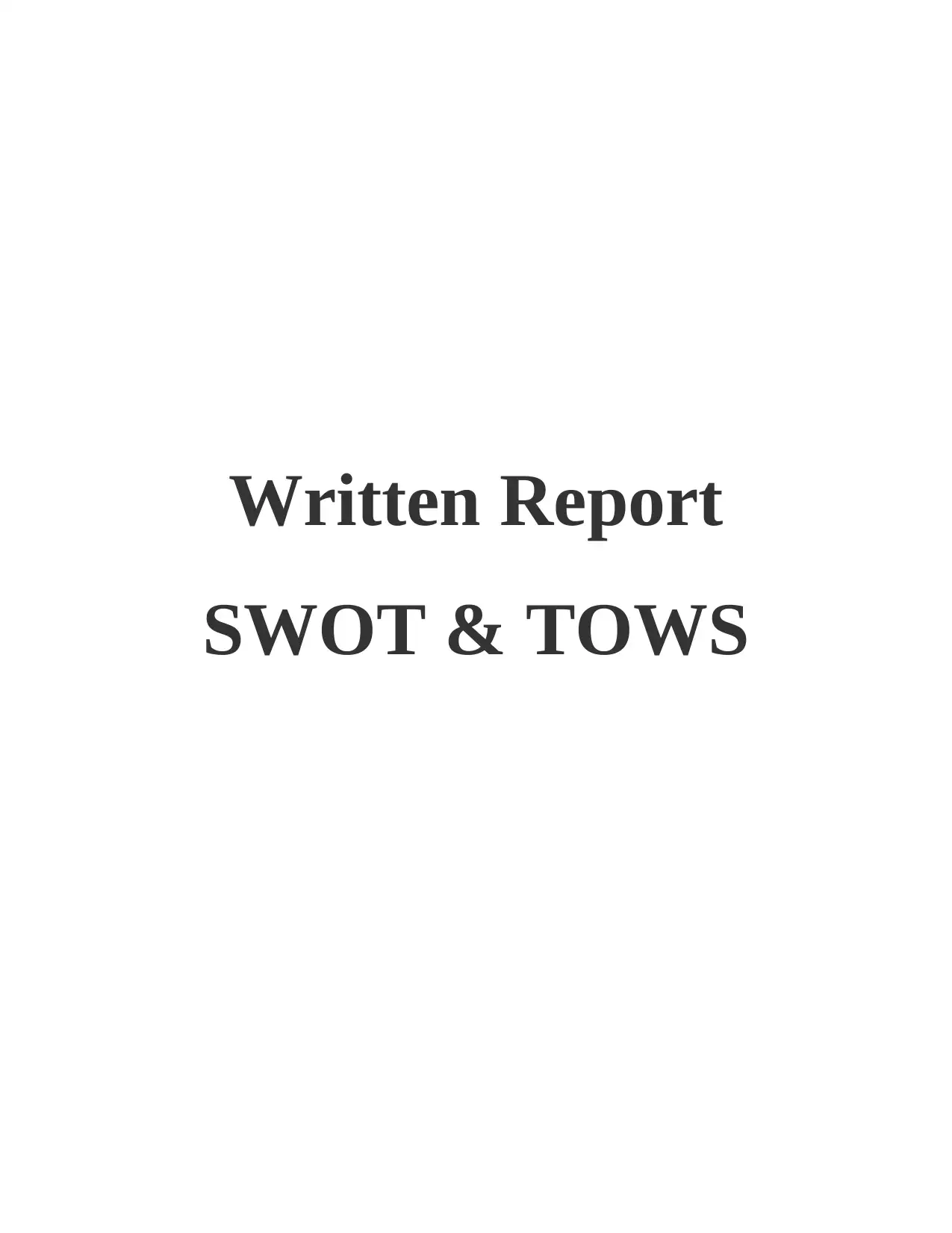
Written Report
SWOT & TOWS
SWOT & TOWS
Paraphrase This Document
Need a fresh take? Get an instant paraphrase of this document with our AI Paraphraser
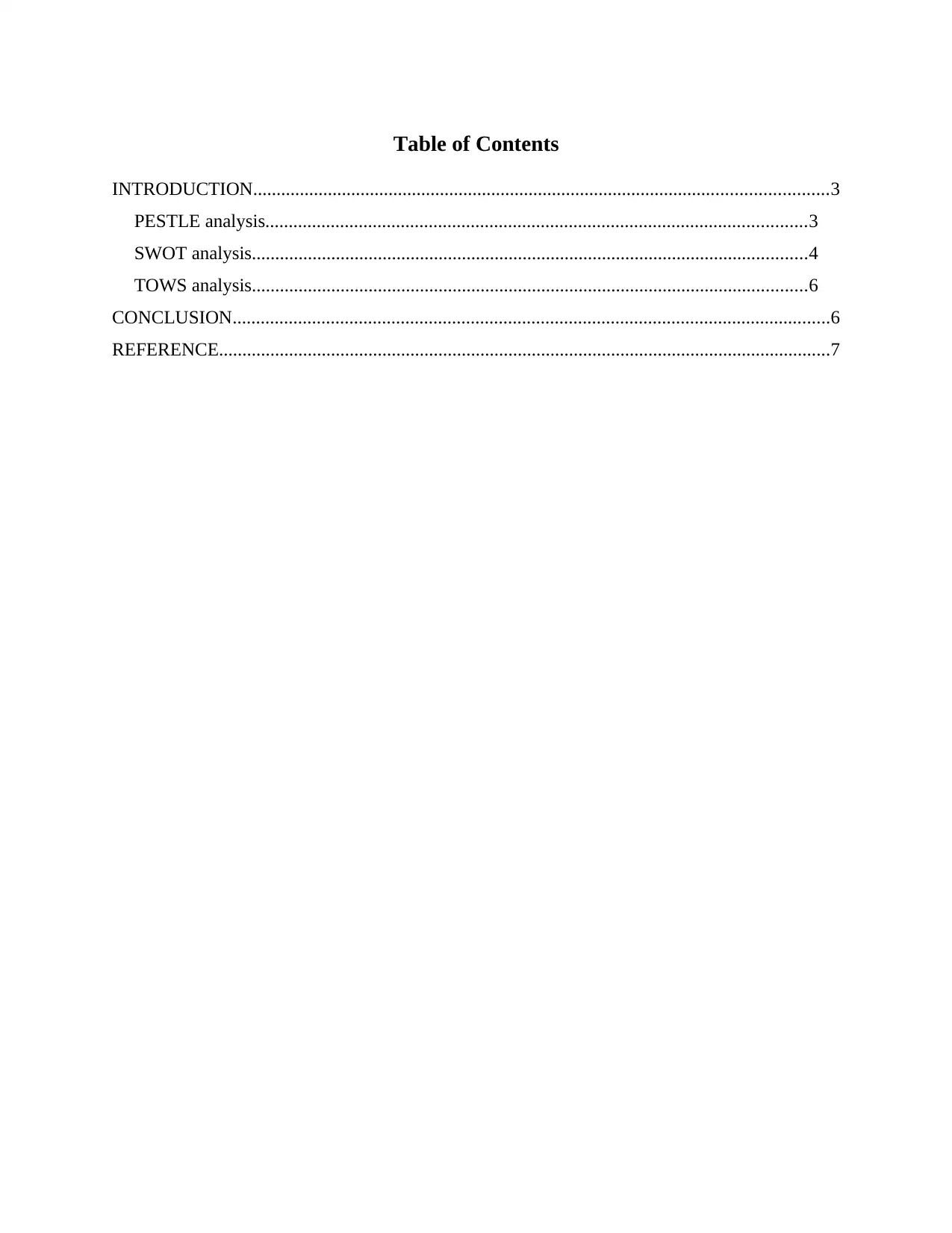
Table of Contents
INTRODUCTION...........................................................................................................................3
PESTLE analysis....................................................................................................................3
SWOT analysis.......................................................................................................................4
TOWS analysis.......................................................................................................................6
CONCLUSION................................................................................................................................6
REFERENCE...................................................................................................................................7
INTRODUCTION...........................................................................................................................3
PESTLE analysis....................................................................................................................3
SWOT analysis.......................................................................................................................4
TOWS analysis.......................................................................................................................6
CONCLUSION................................................................................................................................6
REFERENCE...................................................................................................................................7
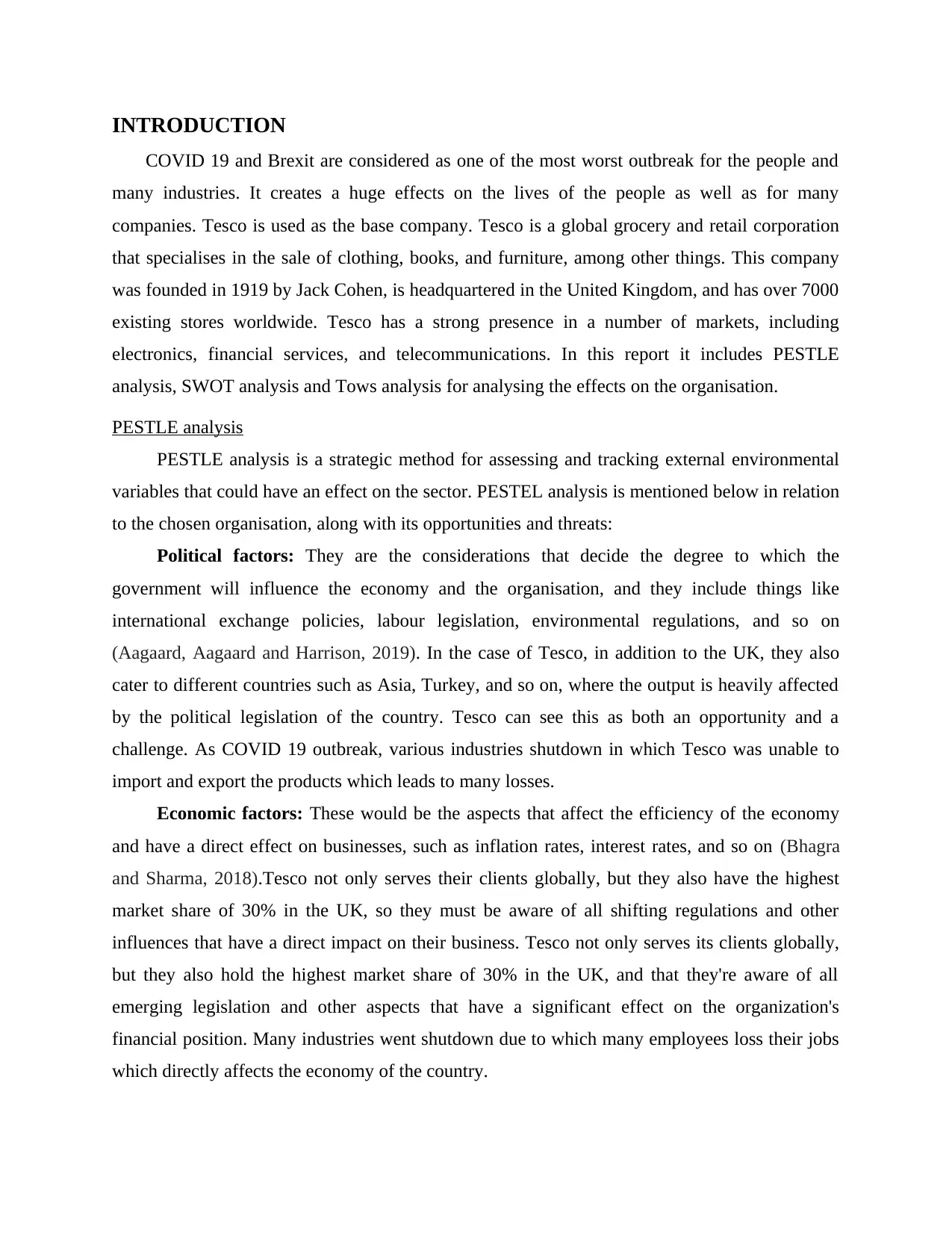
INTRODUCTION
COVID 19 and Brexit are considered as one of the most worst outbreak for the people and
many industries. It creates a huge effects on the lives of the people as well as for many
companies. Tesco is used as the base company. Tesco is a global grocery and retail corporation
that specialises in the sale of clothing, books, and furniture, among other things. This company
was founded in 1919 by Jack Cohen, is headquartered in the United Kingdom, and has over 7000
existing stores worldwide. Tesco has a strong presence in a number of markets, including
electronics, financial services, and telecommunications. In this report it includes PESTLE
analysis, SWOT analysis and Tows analysis for analysing the effects on the organisation.
PESTLE analysis
PESTLE analysis is a strategic method for assessing and tracking external environmental
variables that could have an effect on the sector. PESTEL analysis is mentioned below in relation
to the chosen organisation, along with its opportunities and threats:
Political factors: They are the considerations that decide the degree to which the
government will influence the economy and the organisation, and they include things like
international exchange policies, labour legislation, environmental regulations, and so on
(Aagaard, Aagaard and Harrison, 2019). In the case of Tesco, in addition to the UK, they also
cater to different countries such as Asia, Turkey, and so on, where the output is heavily affected
by the political legislation of the country. Tesco can see this as both an opportunity and a
challenge. As COVID 19 outbreak, various industries shutdown in which Tesco was unable to
import and export the products which leads to many losses.
Economic factors: These would be the aspects that affect the efficiency of the economy
and have a direct effect on businesses, such as inflation rates, interest rates, and so on (Bhagra
and Sharma, 2018).Tesco not only serves their clients globally, but they also have the highest
market share of 30% in the UK, so they must be aware of all shifting regulations and other
influences that have a direct impact on their business. Tesco not only serves its clients globally,
but they also hold the highest market share of 30% in the UK, and that they're aware of all
emerging legislation and other aspects that have a significant effect on the organization's
financial position. Many industries went shutdown due to which many employees loss their jobs
which directly affects the economy of the country.
COVID 19 and Brexit are considered as one of the most worst outbreak for the people and
many industries. It creates a huge effects on the lives of the people as well as for many
companies. Tesco is used as the base company. Tesco is a global grocery and retail corporation
that specialises in the sale of clothing, books, and furniture, among other things. This company
was founded in 1919 by Jack Cohen, is headquartered in the United Kingdom, and has over 7000
existing stores worldwide. Tesco has a strong presence in a number of markets, including
electronics, financial services, and telecommunications. In this report it includes PESTLE
analysis, SWOT analysis and Tows analysis for analysing the effects on the organisation.
PESTLE analysis
PESTLE analysis is a strategic method for assessing and tracking external environmental
variables that could have an effect on the sector. PESTEL analysis is mentioned below in relation
to the chosen organisation, along with its opportunities and threats:
Political factors: They are the considerations that decide the degree to which the
government will influence the economy and the organisation, and they include things like
international exchange policies, labour legislation, environmental regulations, and so on
(Aagaard, Aagaard and Harrison, 2019). In the case of Tesco, in addition to the UK, they also
cater to different countries such as Asia, Turkey, and so on, where the output is heavily affected
by the political legislation of the country. Tesco can see this as both an opportunity and a
challenge. As COVID 19 outbreak, various industries shutdown in which Tesco was unable to
import and export the products which leads to many losses.
Economic factors: These would be the aspects that affect the efficiency of the economy
and have a direct effect on businesses, such as inflation rates, interest rates, and so on (Bhagra
and Sharma, 2018).Tesco not only serves their clients globally, but they also have the highest
market share of 30% in the UK, so they must be aware of all shifting regulations and other
influences that have a direct impact on their business. Tesco not only serves its clients globally,
but they also hold the highest market share of 30% in the UK, and that they're aware of all
emerging legislation and other aspects that have a significant effect on the organization's
financial position. Many industries went shutdown due to which many employees loss their jobs
which directly affects the economy of the country.
⊘ This is a preview!⊘
Do you want full access?
Subscribe today to unlock all pages.

Trusted by 1+ million students worldwide
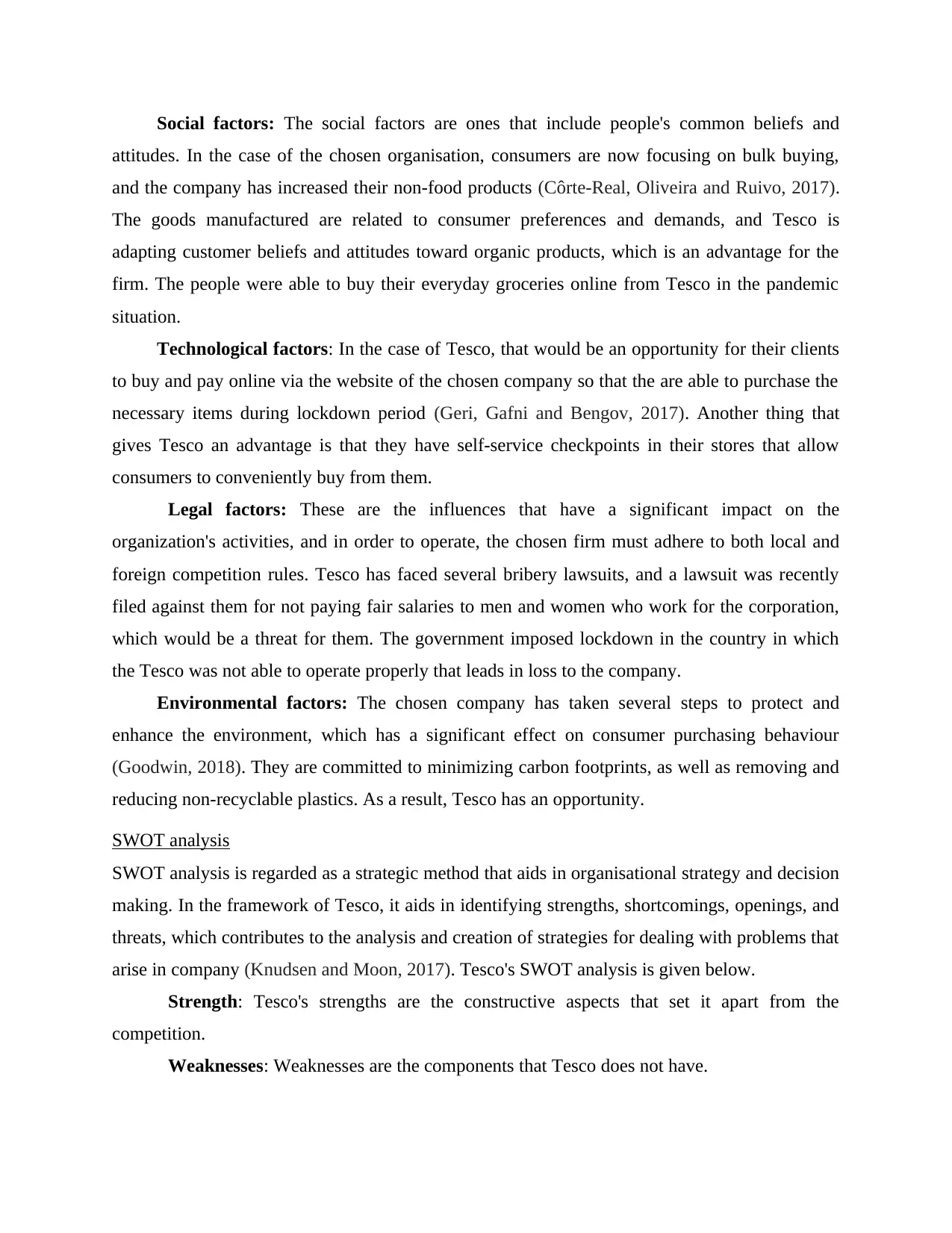
Social factors: The social factors are ones that include people's common beliefs and
attitudes. In the case of the chosen organisation, consumers are now focusing on bulk buying,
and the company has increased their non-food products (Côrte-Real, Oliveira and Ruivo, 2017).
The goods manufactured are related to consumer preferences and demands, and Tesco is
adapting customer beliefs and attitudes toward organic products, which is an advantage for the
firm. The people were able to buy their everyday groceries online from Tesco in the pandemic
situation.
Technological factors: In the case of Tesco, that would be an opportunity for their clients
to buy and pay online via the website of the chosen company so that the are able to purchase the
necessary items during lockdown period (Geri, Gafni and Bengov, 2017). Another thing that
gives Tesco an advantage is that they have self-service checkpoints in their stores that allow
consumers to conveniently buy from them.
Legal factors: These are the influences that have a significant impact on the
organization's activities, and in order to operate, the chosen firm must adhere to both local and
foreign competition rules. Tesco has faced several bribery lawsuits, and a lawsuit was recently
filed against them for not paying fair salaries to men and women who work for the corporation,
which would be a threat for them. The government imposed lockdown in the country in which
the Tesco was not able to operate properly that leads in loss to the company.
Environmental factors: The chosen company has taken several steps to protect and
enhance the environment, which has a significant effect on consumer purchasing behaviour
(Goodwin, 2018). They are committed to minimizing carbon footprints, as well as removing and
reducing non-recyclable plastics. As a result, Tesco has an opportunity.
SWOT analysis
SWOT analysis is regarded as a strategic method that aids in organisational strategy and decision
making. In the framework of Tesco, it aids in identifying strengths, shortcomings, openings, and
threats, which contributes to the analysis and creation of strategies for dealing with problems that
arise in company (Knudsen and Moon, 2017). Tesco's SWOT analysis is given below.
Strength: Tesco's strengths are the constructive aspects that set it apart from the
competition.
Weaknesses: Weaknesses are the components that Tesco does not have.
attitudes. In the case of the chosen organisation, consumers are now focusing on bulk buying,
and the company has increased their non-food products (Côrte-Real, Oliveira and Ruivo, 2017).
The goods manufactured are related to consumer preferences and demands, and Tesco is
adapting customer beliefs and attitudes toward organic products, which is an advantage for the
firm. The people were able to buy their everyday groceries online from Tesco in the pandemic
situation.
Technological factors: In the case of Tesco, that would be an opportunity for their clients
to buy and pay online via the website of the chosen company so that the are able to purchase the
necessary items during lockdown period (Geri, Gafni and Bengov, 2017). Another thing that
gives Tesco an advantage is that they have self-service checkpoints in their stores that allow
consumers to conveniently buy from them.
Legal factors: These are the influences that have a significant impact on the
organization's activities, and in order to operate, the chosen firm must adhere to both local and
foreign competition rules. Tesco has faced several bribery lawsuits, and a lawsuit was recently
filed against them for not paying fair salaries to men and women who work for the corporation,
which would be a threat for them. The government imposed lockdown in the country in which
the Tesco was not able to operate properly that leads in loss to the company.
Environmental factors: The chosen company has taken several steps to protect and
enhance the environment, which has a significant effect on consumer purchasing behaviour
(Goodwin, 2018). They are committed to minimizing carbon footprints, as well as removing and
reducing non-recyclable plastics. As a result, Tesco has an opportunity.
SWOT analysis
SWOT analysis is regarded as a strategic method that aids in organisational strategy and decision
making. In the framework of Tesco, it aids in identifying strengths, shortcomings, openings, and
threats, which contributes to the analysis and creation of strategies for dealing with problems that
arise in company (Knudsen and Moon, 2017). Tesco's SWOT analysis is given below.
Strength: Tesco's strengths are the constructive aspects that set it apart from the
competition.
Weaknesses: Weaknesses are the components that Tesco does not have.
Paraphrase This Document
Need a fresh take? Get an instant paraphrase of this document with our AI Paraphraser
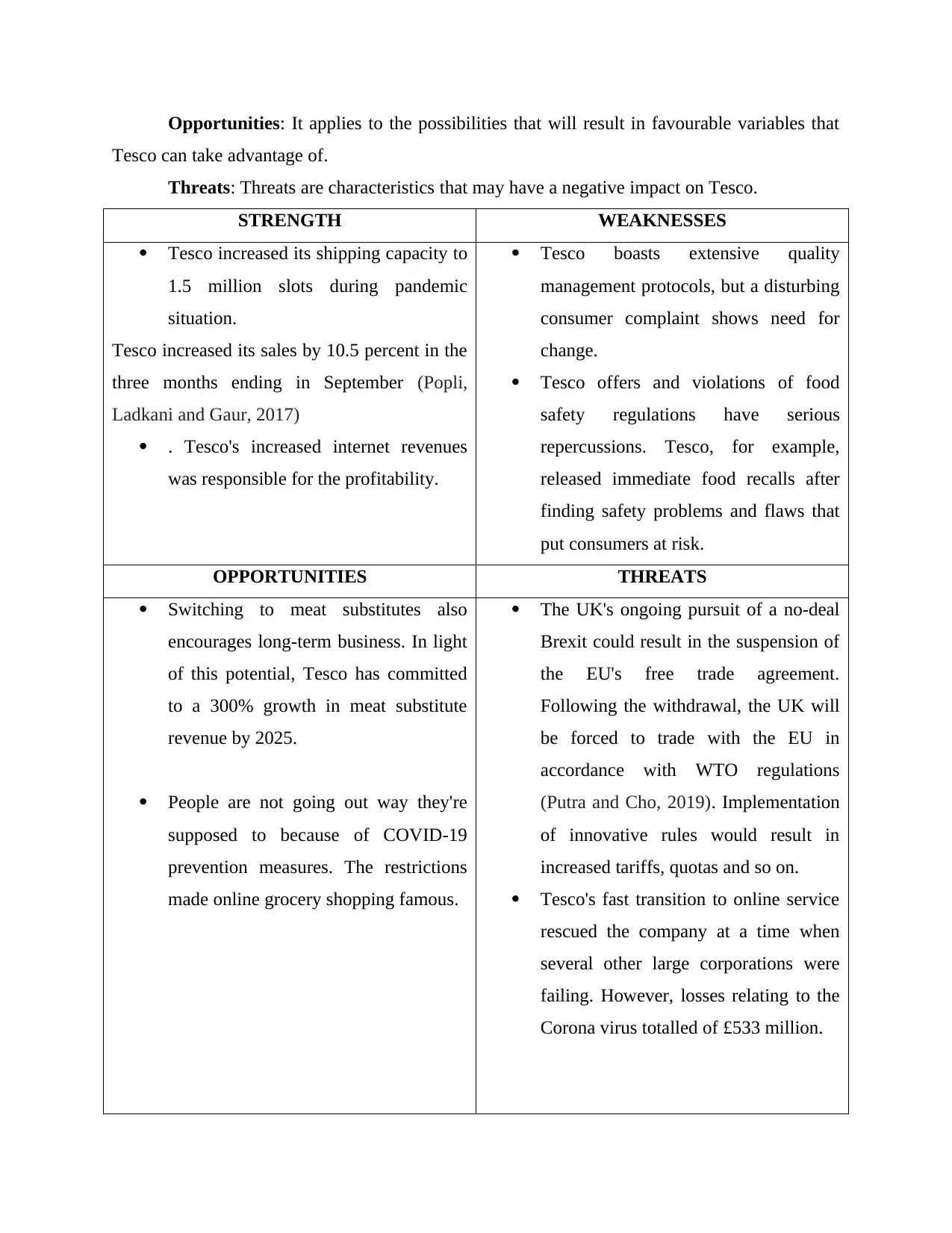
Opportunities: It applies to the possibilities that will result in favourable variables that
Tesco can take advantage of.
Threats: Threats are characteristics that may have a negative impact on Tesco.
STRENGTH WEAKNESSES
Tesco increased its shipping capacity to
1.5 million slots during pandemic
situation.
Tesco increased its sales by 10.5 percent in the
three months ending in September (Popli,
Ladkani and Gaur, 2017)
. Tesco's increased internet revenues
was responsible for the profitability.
Tesco boasts extensive quality
management protocols, but a disturbing
consumer complaint shows need for
change.
Tesco offers and violations of food
safety regulations have serious
repercussions. Tesco, for example,
released immediate food recalls after
finding safety problems and flaws that
put consumers at risk.
OPPORTUNITIES THREATS
Switching to meat substitutes also
encourages long-term business. In light
of this potential, Tesco has committed
to a 300% growth in meat substitute
revenue by 2025.
People are not going out way they're
supposed to because of COVID-19
prevention measures. The restrictions
made online grocery shopping famous.
The UK's ongoing pursuit of a no-deal
Brexit could result in the suspension of
the EU's free trade agreement.
Following the withdrawal, the UK will
be forced to trade with the EU in
accordance with WTO regulations
(Putra and Cho, 2019). Implementation
of innovative rules would result in
increased tariffs, quotas and so on.
Tesco's fast transition to online service
rescued the company at a time when
several other large corporations were
failing. However, losses relating to the
Corona virus totalled of £533 million.
Tesco can take advantage of.
Threats: Threats are characteristics that may have a negative impact on Tesco.
STRENGTH WEAKNESSES
Tesco increased its shipping capacity to
1.5 million slots during pandemic
situation.
Tesco increased its sales by 10.5 percent in the
three months ending in September (Popli,
Ladkani and Gaur, 2017)
. Tesco's increased internet revenues
was responsible for the profitability.
Tesco boasts extensive quality
management protocols, but a disturbing
consumer complaint shows need for
change.
Tesco offers and violations of food
safety regulations have serious
repercussions. Tesco, for example,
released immediate food recalls after
finding safety problems and flaws that
put consumers at risk.
OPPORTUNITIES THREATS
Switching to meat substitutes also
encourages long-term business. In light
of this potential, Tesco has committed
to a 300% growth in meat substitute
revenue by 2025.
People are not going out way they're
supposed to because of COVID-19
prevention measures. The restrictions
made online grocery shopping famous.
The UK's ongoing pursuit of a no-deal
Brexit could result in the suspension of
the EU's free trade agreement.
Following the withdrawal, the UK will
be forced to trade with the EU in
accordance with WTO regulations
(Putra and Cho, 2019). Implementation
of innovative rules would result in
increased tariffs, quotas and so on.
Tesco's fast transition to online service
rescued the company at a time when
several other large corporations were
failing. However, losses relating to the
Corona virus totalled of £533 million.
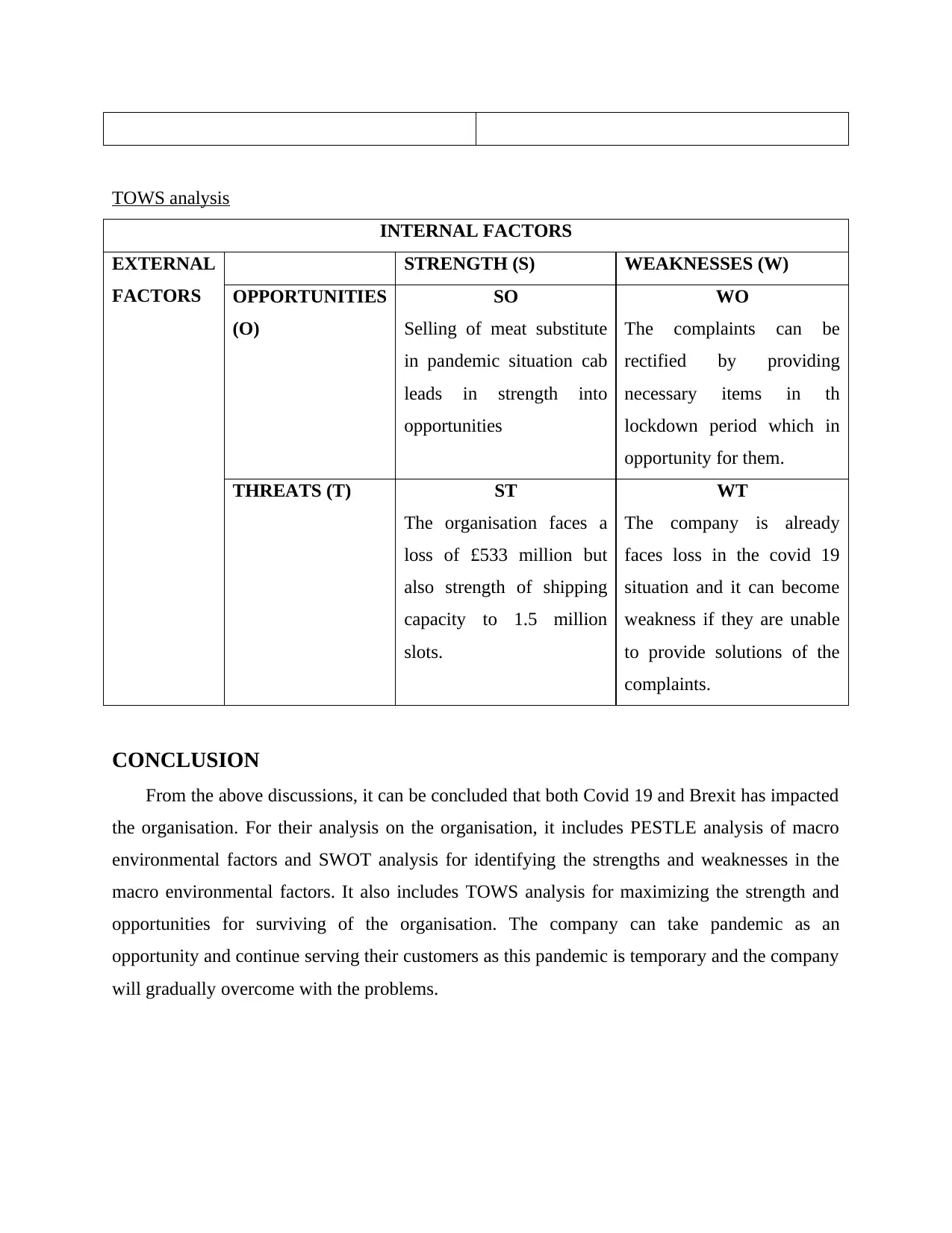
TOWS analysis
INTERNAL FACTORS
EXTERNAL
FACTORS
STRENGTH (S) WEAKNESSES (W)
OPPORTUNITIES
(O)
SO
Selling of meat substitute
in pandemic situation cab
leads in strength into
opportunities
WO
The complaints can be
rectified by providing
necessary items in th
lockdown period which in
opportunity for them.
THREATS (T) ST
The organisation faces a
loss of £533 million but
also strength of shipping
capacity to 1.5 million
slots.
WT
The company is already
faces loss in the covid 19
situation and it can become
weakness if they are unable
to provide solutions of the
complaints.
CONCLUSION
From the above discussions, it can be concluded that both Covid 19 and Brexit has impacted
the organisation. For their analysis on the organisation, it includes PESTLE analysis of macro
environmental factors and SWOT analysis for identifying the strengths and weaknesses in the
macro environmental factors. It also includes TOWS analysis for maximizing the strength and
opportunities for surviving of the organisation. The company can take pandemic as an
opportunity and continue serving their customers as this pandemic is temporary and the company
will gradually overcome with the problems.
INTERNAL FACTORS
EXTERNAL
FACTORS
STRENGTH (S) WEAKNESSES (W)
OPPORTUNITIES
(O)
SO
Selling of meat substitute
in pandemic situation cab
leads in strength into
opportunities
WO
The complaints can be
rectified by providing
necessary items in th
lockdown period which in
opportunity for them.
THREATS (T) ST
The organisation faces a
loss of £533 million but
also strength of shipping
capacity to 1.5 million
slots.
WT
The company is already
faces loss in the covid 19
situation and it can become
weakness if they are unable
to provide solutions of the
complaints.
CONCLUSION
From the above discussions, it can be concluded that both Covid 19 and Brexit has impacted
the organisation. For their analysis on the organisation, it includes PESTLE analysis of macro
environmental factors and SWOT analysis for identifying the strengths and weaknesses in the
macro environmental factors. It also includes TOWS analysis for maximizing the strength and
opportunities for surviving of the organisation. The company can take pandemic as an
opportunity and continue serving their customers as this pandemic is temporary and the company
will gradually overcome with the problems.
⊘ This is a preview!⊘
Do you want full access?
Subscribe today to unlock all pages.

Trusted by 1+ million students worldwide
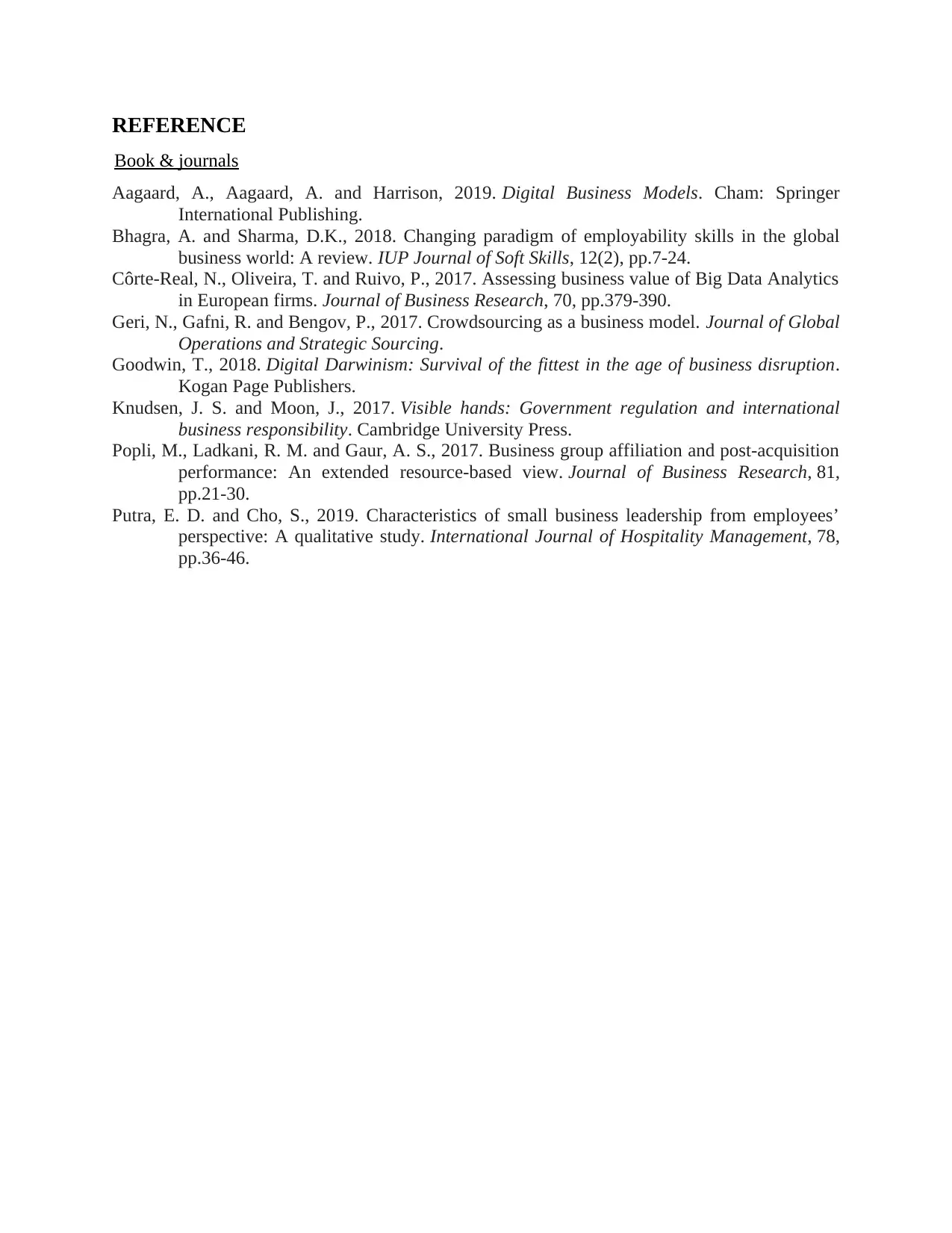
REFERENCE
Book & journals
Aagaard, A., Aagaard, A. and Harrison, 2019. Digital Business Models. Cham: Springer
International Publishing.
Bhagra, A. and Sharma, D.K., 2018. Changing paradigm of employability skills in the global
business world: A review. IUP Journal of Soft Skills, 12(2), pp.7-24.
Côrte-Real, N., Oliveira, T. and Ruivo, P., 2017. Assessing business value of Big Data Analytics
in European firms. Journal of Business Research, 70, pp.379-390.
Geri, N., Gafni, R. and Bengov, P., 2017. Crowdsourcing as a business model. Journal of Global
Operations and Strategic Sourcing.
Goodwin, T., 2018. Digital Darwinism: Survival of the fittest in the age of business disruption.
Kogan Page Publishers.
Knudsen, J. S. and Moon, J., 2017. Visible hands: Government regulation and international
business responsibility. Cambridge University Press.
Popli, M., Ladkani, R. M. and Gaur, A. S., 2017. Business group affiliation and post-acquisition
performance: An extended resource-based view. Journal of Business Research, 81,
pp.21-30.
Putra, E. D. and Cho, S., 2019. Characteristics of small business leadership from employees’
perspective: A qualitative study. International Journal of Hospitality Management, 78,
pp.36-46.
Book & journals
Aagaard, A., Aagaard, A. and Harrison, 2019. Digital Business Models. Cham: Springer
International Publishing.
Bhagra, A. and Sharma, D.K., 2018. Changing paradigm of employability skills in the global
business world: A review. IUP Journal of Soft Skills, 12(2), pp.7-24.
Côrte-Real, N., Oliveira, T. and Ruivo, P., 2017. Assessing business value of Big Data Analytics
in European firms. Journal of Business Research, 70, pp.379-390.
Geri, N., Gafni, R. and Bengov, P., 2017. Crowdsourcing as a business model. Journal of Global
Operations and Strategic Sourcing.
Goodwin, T., 2018. Digital Darwinism: Survival of the fittest in the age of business disruption.
Kogan Page Publishers.
Knudsen, J. S. and Moon, J., 2017. Visible hands: Government regulation and international
business responsibility. Cambridge University Press.
Popli, M., Ladkani, R. M. and Gaur, A. S., 2017. Business group affiliation and post-acquisition
performance: An extended resource-based view. Journal of Business Research, 81,
pp.21-30.
Putra, E. D. and Cho, S., 2019. Characteristics of small business leadership from employees’
perspective: A qualitative study. International Journal of Hospitality Management, 78,
pp.36-46.
1 out of 7
Related Documents
Your All-in-One AI-Powered Toolkit for Academic Success.
+13062052269
info@desklib.com
Available 24*7 on WhatsApp / Email
![[object Object]](/_next/static/media/star-bottom.7253800d.svg)
Unlock your academic potential
Copyright © 2020–2025 A2Z Services. All Rights Reserved. Developed and managed by ZUCOL.




